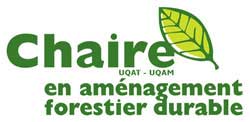Discovering secrets of the oldest trees in Quebec: the white cedars at Duparquet Lake
- Direction : Yves Bergeron, Fabio Gennaretti
- Institution : UQAT
- programme : master in ecology
- Support financier : Scholarship of 17,500 $/year over two years
- Date d'inscription : Summer 2021
- Offre en format pdf: Télécharger
We are looking for a student to conduct an exciting master's project on the ecophysiology of the oldest trees in Quebec. Located in the Abitibi region of Quebec, Duparquet Lake offers a unique natural environment with over 100 islands housing a variety of remarkable ecosystems. On some of these islands, we can find xeric sites colonized by the oldest white cedars in North America. Several of these trees are almost 1000 years old and represent the oldest living trees in Quebec. The mechanisms involved in tree longevity remain imperfectly understood. Long-lived trees have developed resistance traits linked to their genetics and environment, which reduce the susceptibility to mortality. For example, increased resistance to cavitation, greater concentration of lignin and phenolic compounds, and particular carbon allocation strategies such as unilateral trunk growth allowing the concentration of available resources on a smaller surface. Our project's goal is to reveal the reasons for the exceptional longevity of these cedars via ecophysiology and state-of-the-art equipment recently acquired by UQAT. We also want to develop a management strategy to contribute to ecotourism in the study region. In addition, the cedar forests around the lake are forests with high conservation value and their management is also important for the FSC® certifications of our partners.
Objectives and methodology
The cedars at Duparquet Lake are an important legacy given the scarcity of trees that are over 400 years old in the boreal region. Recent studies reveal that these cedars have increased their water use efficiency in response to environmental changes. However, we still need to understand how these trees can modulate their carbon use to reduce their water and energy losses and survive over time. This project aims to delve deeper into the ecophysiological mechanisms that allow Duparquet Lake cedars to be so long-lived. Our objectives are to: (1) study foliar gas exchanges of long-lived cedars at Duparquet Lake, (2) analyze the tolerance of these cedars to low water availability conditions, (3) study their morphology, growth and resource allocation, and (4) develop the associated ecotourism potential in partnership with regional collaborators.
Profil recherché
Bachelor’s degree in ecology or forestry, or a related discipline with an interest in ecology and climate change. The student must be able to work with autonomy, curiosity, rigour and motivation within a multidisciplinary team. He/she should be willing to carry out fieldwork in remote locations, have good team spirit, and excellent writing skills. A driving license and aptitudes in statistical analyses and scientific communication are an asset.
Lieu
The student will be based at the Forest Research Institute (Institut de recherche sur les forêts; IRF; https://www.uqat.ca/programmes/irf/) at the Amos campus, under the supervision of Fabio Gennaretti and Yves Bergeron . The Forest Research Institute is a dynamic, multicultural, and international institute, which provides a quality environment for students to develop research. The institute includes 13 professors and more than 60 graduate students working on a wide range of topics such as modelling, silviculture, genetics, biodiversity, ecophysiology, remote sensing, and sustainable forest management. The student will be a member of the Centre for Forest Research (Centre d'étude de la forêt; CEF), and of the Abitibi Regional County Municipality ecology research group (GREMA). Amos is an expanding campus with state-of-the-art infrastructures and a dynamic student life. The student will collaborate actively with our partners (CREAT, Tourisme Abitibi-Témiscamingue and RYAM Forest Management). The facilities of the Lake Duparquet Research and Teaching Forest (FERLD) will be fully available to the student.
Direction
Yves Bergeron, Fabio Gennaretti
Renseignements
Send your application in a single pdf containing a curriculum vitae, a cover letter, academic transcripts, and contact details for three references to Fabio Gennaretti (fabio.gennaretti@uqat.ca). We will continue to review applications until the position is filled.
Retour à la liste des offres